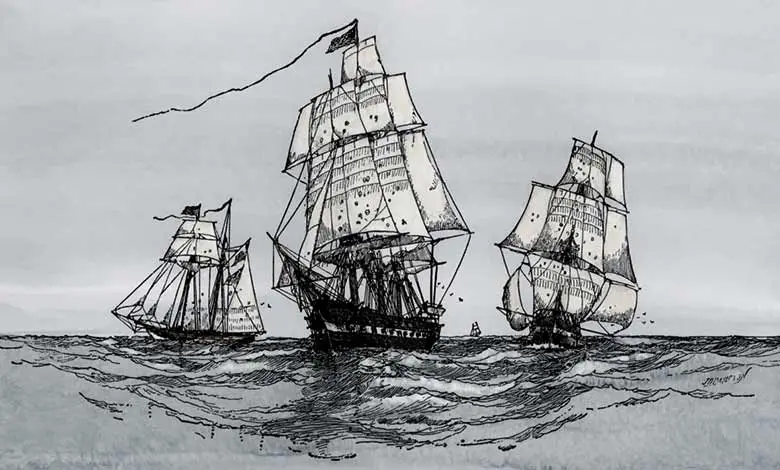
The Napoleonic War happened between Great Britain and France in 1803. At this time, Americans saw the war as an opportunity for trade in Europe. Great Britain seizes American ships because of the American-France trade. Americans tried to conduct trade with France, which was against British law. As a result, The British began capturing sailors and passengers from American ships, which is near about 500.
During WWI, British naval forces tried to impose a blockade on Germany, which included stopping and searching neutral ships, including those from the United States, for contraband. While not as direct or confrontational as the impressment during the Napoleonic Wars, this caused tensions between the U.S. and Britain.
Why did Great Britain seize American ships? (History of US-UK war)
In 1812, the young nation of the United States took on the country with the most powerful navy in the world in a war. That would affect more than the former colonies and their colonizer. The United States of America first gained freedom from the British in an eight-year Revolutionary War that finally ended when Britain inevitably recognized the independence of their 13 former colonies.
On September 3rd, 1783, one of the most relevant impacts of this war that would fuel future tensions between the US and Britain was the role of the Native Americans. During the revolution, the Native Americans mostly supported the Brits, who they hoped would continue to restrict expansion from the US settlers into Native American territory. When Britain failed to maintain its rule over the colonies, the United States eventually accelerated its takeover of native land, causing even more friction between the American societies.
As the years passed, this friction grew stronger as Britain remained a driving force of the discord. Since not only had the natives taken their side in the revolution, but the British also openly encouraged the Native Americans to fight back against their antagonists by 1812. This, combined with a few other factors, led to the development of a new war. The United States was unhappy with the United opposition from Britain and the natives. They were also infuriated by allegations that the Royal Navy was using an imprisonment tactic to take us, men, for their troops.
On top of this, the ongoing strife between Britain and France had a notable impact on the United States. Heavily locked in their struggle, the warring nations tried to restrict trade from neutral countries and punish anyone who attempted to ignore the constraints. This put the United States in a detrimental position due to their inability to continue trade with either nation unless they wanted to risk invoking the wrath of the other side.
While France took a more laid-back approach to ensure the US abstained from doing business with the British, the latter was more aggressive.
“On January 7th, 1807, Britain issued an order in council stating it is hereby ordered that no vessels be permitted to trade from one port to another. Both ports shall belong to or have France or her allies or shall be so far under their control as the British vessels may not freely trade. Furthermore, ships that refused to obey these restrictions would be subject to seizure by the Royal Navy cargo and all by November.”
The original order was expanded to include all the ports and places of France, her allies, or any other country at war with His Majesty. The British flag is excluded, and all ports or places in the colonies belong to His Majesty’s enemies.
In retaliation, France, under the command of Napoleon Bonaparte, issued the Milan Decree. He said that every ship to whatever nation it may belong shall have submitted to be searched by an English ship or to a voyage to England or shall have paid any tax whatsoever to the English government. For that alone declared to be deemed nationalized, to have forfeited the protection of its king, and to have become English property. Additionally, Napoleon declared that any of the aforementioned ships that entered French ports or those of French allies were good and lawful.
“Us President Thomas Jefferson signed the Embargo Act in December of 1807, blocking all international trade from American ports and taking direct aim at Britain. Unfortunately for America, the act backfired and turned the US into more of a victim than anyone else.”
Emphasizing this point, the minister to France said it is not felt here and is forgotten in England. The effects of the Embargo Act ultimately pushed the US into an economic depression, and it had to be repealed. Less than two years after the initial signature was in place, the Non-Intercourse Act was passed, which forbade trade with Britain, France, and their colonies.
When this new act proved ineffective, the United States tried again, passing Macon’s bill number two. In May of 1810, this bill lifted trading bans and stated that if either France or Britain removed their restrictions, the US would re-establish an embargo with the opposing nation. By August, Napoleon enacted a plan to exacerbate tension between Britain and the United States, which ultimately worked.
Although Napoleon never followed through on his proclamation, Britain and the United States were on the brink of an all-out war. The final straw came when the Battle of Tippecanoe unfolded in late 1811 as the US troops claimed victory over the Native Americans, wishing to stop further expansion.
Learn more:
